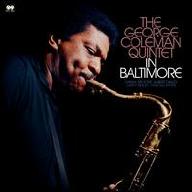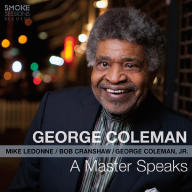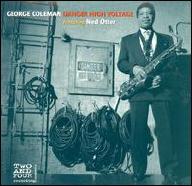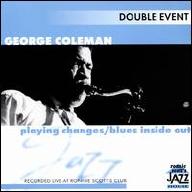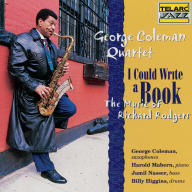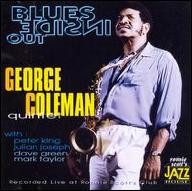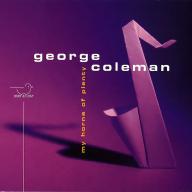Born in Memphis, Tennessee in 1935, Coleman was largely self-taught on the saxophone and drew early inspiration from artists like Charlie Parker and Sonny Stitt. Growing up, he found himself surrounded by a bevy of future jazz luminaries including trumpeter Booker Little, pianist Harold Mabern, and saxophonists Hank Crawford, Frank Strozier, and Charles Lloyd. He developed quickly, and in 1952 garnered his first major job touring with blues guitarist/vocalist B.B. King. After a final stint with King in 1955, Coleman relocated to Chicago along with trumpeter Little. Settling quickly into the vibrant Windy City jazz scene, he found work with Gene Ammons, Johnny Griffin, Walter Perkins' MJT + 3, and others. In 1957, he made his record debut, appearing on trumpeter Lee Morgan's City Lights. The following year, he joined organist Jimmy Smith for House Party and The Sermon!
Around this time, Coleman caught the ear of drummer Roach, who invited him to join his ensemble. Coleman moved to New York, as did Little, who soon became part of the group as well, replacing trumpeter Kenny Dorham. Together, the Memphis pair appeared on several of Roach's albums including Max Roach + 4 at Newport (1958), Award-Winning Drummer (1958), and The Many Sides of Max (1959). In 1959, Coleman left Roach to join trombonist Slide Hampton's octet. He spent two years with Hampton, touring Europe and developing his composing and arranging skills, a formative period that would later influence the sound of his own octet.
In 1963, following a brief stint with organist Wild Bill Davis, Coleman was invited to join Miles Davis' quintet. For two years, Coleman toured and recorded with Davis, playing alongside pianist Herbie Hancock, bassist Ron Carter, and drummer Tony Williams. During this period, he appeared on several of Davis' most well-known albums including Seven Steps to Heaven (1963), Miles Davis in Europe (1964), My Funny Valentine (1965), and Four More (1966).
After parting ways with Davis in 1964, Coleman embarked on an extended period of freelance work in New York, during which time he performed with such artists as Lionel Hampton, Betty Carter, Chet Baker, Shirley Scott, Charles McPherson, and others. Around this time, he appeared on such albums as Herbie Hancock's Maiden Voyage (1965), Lee Morgan's The Procrastinator (1967), Nina Simone's Silk and Soul (1967), Reuben Wilson's Love Bug (1969), and more.
During the '70s, Coleman continued to tour and record, appearing regularly with drummer Elvin Jones, trumpeter Charles Tolliver, bassist Charles Mingus, and others. He began leading his own groups and spent many years in Europe, regularly playing festivals and concert halls. Despite, or perhaps because of, his success as a sideman, Coleman's own recorded output didn't pick up until the 1970s. In 1975, he joined pianist Cedar Walton for Eastern Rebellion, Vol. 1, followed by several more solo dates including his 1977 octet album Big George, 1977's Dynamic Duo with pianist Tete Montoliu, 1979's Playing Changes, and 1979's Amsterdam After Dark.
In the '80s, Coleman kept a busy live schedule, often appearing with a small group featuring his longtime collaborator pianist Harold Mabern or with his larger octet. He released several more albums including Manhattan Panorama (1985) and At Yoshi's (1987). Also in the '80s, he started teaching more regularly, both privately and on the university level, where he began leading workshops and masterclasses around the country.
The '90s were a fruitful decade for Coleman, who continued to split his time between performing and teaching. He also found time to record a handful of albums: My Horns of Plenty (1992), Blues Inside Out (1997), and I Could Write a Book: The Music of Richard Rodgers (1998). Ever adventurous, Coleman even branched out into acting, appearing in the 1992 sci-fi film Freejack with Mick Jagger and Anthony Hopkins. He also garnered a small role in 1996's The Preacher's Wife alongside Denzel Washington and Whitney Houston.
In 2000, he re-formed his octet for Danger High Voltage. Two years later, he joined several Davis band alumni, including bassist Ron Carter, for the concert tribute album Four Generations of Miles. Arriving in 2014, Down for the Count found him paired with guitarist John Webber. The following year, Coleman's many achievements as a performer and educator were recognized when he was named an NEA Jazz Master along with longtime Memphis cohort Charles Lloyd. In 2016, he delivered A Master Speaks, recorded live at Smoke in N.Y.C. A second Smoke Sessions release, The Quartet, arrived in 2019 and featured pianist Harold Mabern, who died just prior to the album's release. ~ Matt Collar, Rovi


